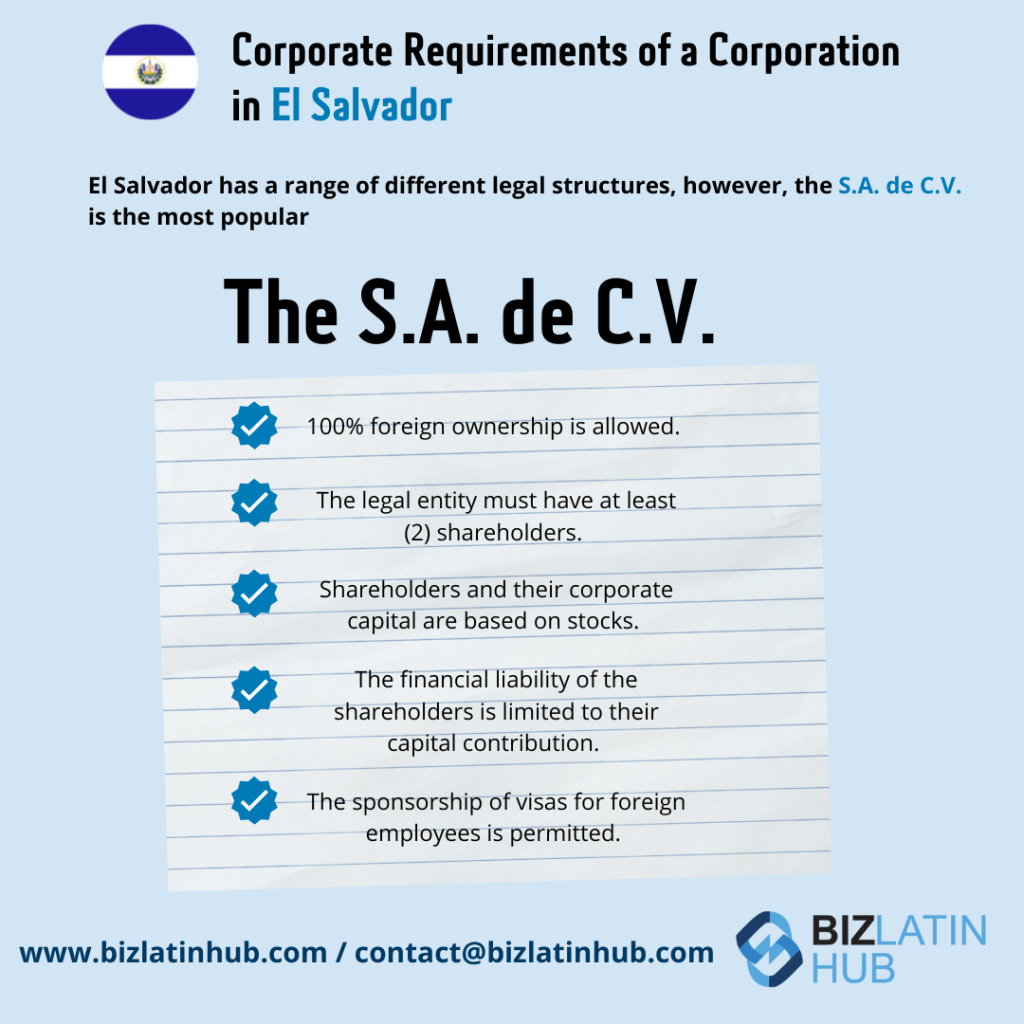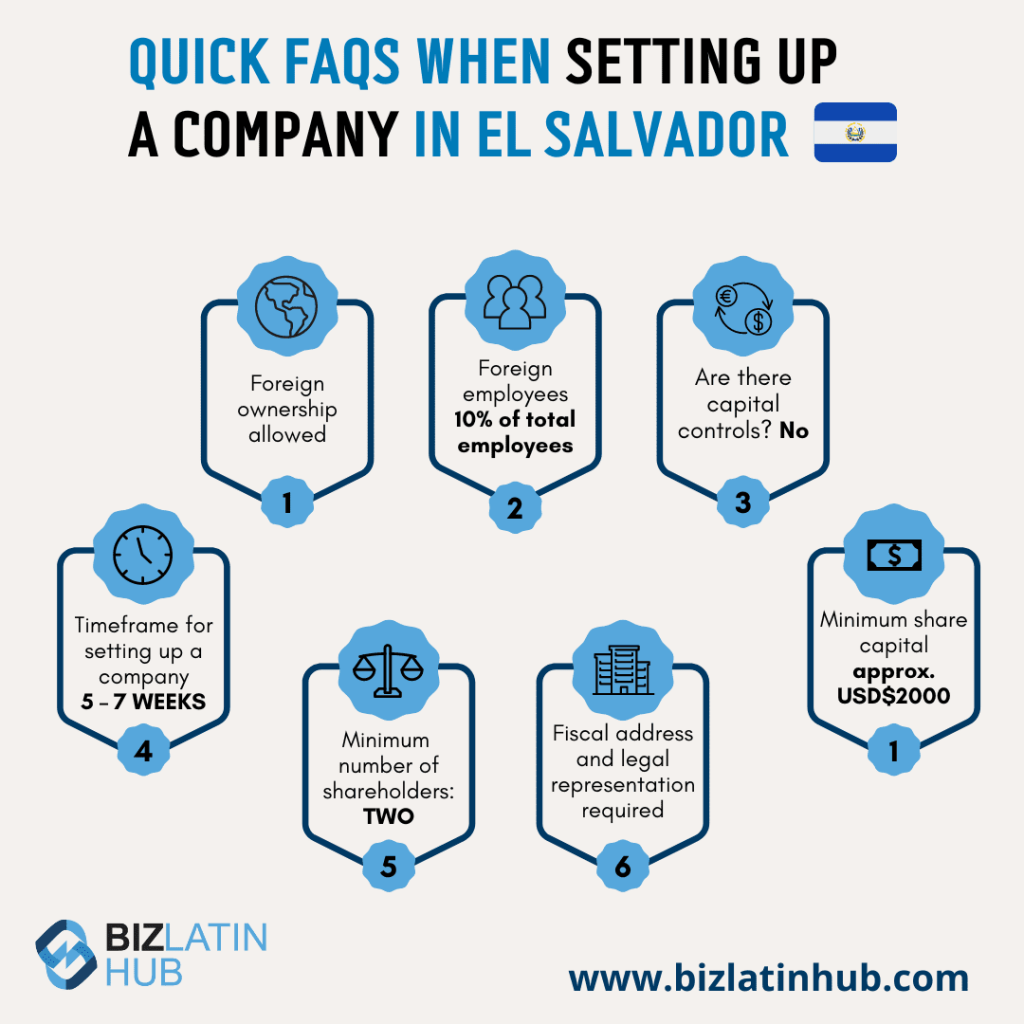Understanding the characteristics of types of companies in El Salvador is essential for choosing the right corporate structure when looking to register a company in El Salvador. Understanding and adhering to all legal and accounting requirements specific to the legal entities in El Salvador is essential for smooth operations and continued compliance. Working with local experts allows you to navigate the regulatory framework with confidence and clarity. Whether opting for flexibility or liability protection, at Biz Latin Hub, we provide the knowledge and support you need to ensure seamless integration into the Salvadorian entrepreneurial ecosystem.
Key Takeaways
| Common legal entity types in El Salvador | Limited Liability Company LLC (Sociedad de Responsabilidad Limitada – SRL). Variable Capital Corporations (Sociedades Anónimas de Capital Variable – SA de CV.). Corporation (Sociedad Anonima – SA). Company in Collective Name (Sociedad en Nombre Colectivo – SNC). Branch (Sucursal). |
| What is the most common Salvadorian legal entity? | The most common entity type in El Salvador is the Corporation (SA), as well as its variation the Variable Capital Corporation (SA de CV) that has very similar properties. |
| What are the primary considerations when choosing a business entity in El Salvador? | Ownership Structure. Tax Efficiency. Profit distribution. Transfer Pricing. Compliance. Flexibility. |
4 Types of Companies in El Salvador
There are various types of legal entities in El Salvador available for foreign investors, these include:
- Limited Liability Company LLC (Sociedad de Responsabilidad Limitada – SRL).
- Variable Capital Corporations (Sociedades Anónimas de Capital Variable – SA de CV).
- Corporation (Sociedad Anonima – SA).
- Company in Collective Name (Sociedad en Nombre Colectivo – SNC).
- Branch (Sucursal).
All these legal entities must have a company legal representative and a legal/fiscal address in Peru. They also must make monthly and annual tax declarations to the local tax authorities.
Keep reading if you are interested in doing business in El Salvador and need to find out about the different types of companies available.
1. Limited Liability Company LLC (Sociedad de Responsabilidad Limitada – SRL)
The Limited Liability Company LLC (SRL) is one of the most common business structures in El Salvador, particularly suited for small and medium-sized enterprises (SMEs). It offers limited liability to its partners, ensuring that their personal assets are protected from the company’s debts and obligations. This makes it an appealing option for entrepreneurs and family-owned businesses seeking simplicity and security.
The SRL operates with a relatively straightforward management structure, where ownership is divided into quotas instead of shares. This ensures that the transfer of ownership is controlled and requires the approval of the other partners, making it ideal for businesses that prioritize privacy and internal control. Its combination of limited liability, operational simplicity, and regulatory flexibility makes it a popular choice among local and international investors.
This company structure is most commonly employed by private companies, and in circumstances where partners and a third party want to participate in the company formation. Once the partners have agreed on the aforementioned selection process, the denomination or name of the company it must include the words Sociedad de Responsabilidad Limitada for registration purposes.
Key Characteristics and Requirements:
- Partners: Requires a minimum of two and a maximum of 50 partners, who can be individuals or legal entities of any nationality.
- Liability: Partners’ liability is limited to their contributions, protecting personal assets.
- Capital Requirements: No specific minimum capital is required; however, all contributions must be fully paid upon incorporation.
- Management: Managed by one or more administrators, who may be appointed from among the partners or externally.
- Ownership Transfer: Quotas (ownership units) cannot be freely transferred without the approval of the other partners.
- Legal Requirements:
- Must have a fiscal address in El Salvador.
- Must register with the Salvadoran Commercial Registry.
- Appointment of a legal representative is mandatory.
- Taxation: Subject to corporate taxes on income generated within El Salvador.
2. Variable Capital Corporations (Sociedades Anónimas de Capital Variable – SA de CV)
The Sociedad Anónima de Capital Variable (SA de CV) is a flexible corporate structure that allows companies to adjust their capital without undergoing complex legal processes. This feature makes it particularly attractive for businesses that anticipate fluctuations in their capital needs, such as startups, growing enterprises, or companies operating in dynamic industries.
The SA de CV offers the same benefits as a traditional corporation (Sociedad Anónima – SA), including limited liability for shareholders and the ability to issue shares. However, its variable capital framework allows the company to increase or decrease its capital more easily, offering greater adaptability to changing market conditions or investment opportunities. This structure is especially appealing to businesses that want to attract investors while maintaining operational flexibility.
Key Characteristics and Requirements:
- Shareholders: Requires a minimum of two shareholders, with no maximum limit. Shareholders can be individuals or legal entities of any nationality.
- Liability: Shareholders’ liability is limited to the amount of their contributions, protecting personal assets from business liabilities.
- Variable Capital Feature:
- The company’s capital is divided into fixed capital (which cannot be adjusted without amending the bylaws) and variable capital (which can be increased or decreased with shareholder approval).
- Adjustments to the variable capital do not require amendments to the company’s bylaws, simplifying the process.
- Capital Requirements: A minimum initial capital contribution of USD $2,000 is required, with at least 5% paid at the time of incorporation.
- Management Structure: The company is managed by a board of directors and a General Manager, who are responsible for strategic and operational decision-making.
- Share Issuance: Shares can be freely issued and transferred unless restricted by the bylaws. Variable capital shares can be issued based on the company’s needs.
- Legal Requirements:
- Registration with the Salvadoran Commercial Registry.
- A fiscal address in El Salvador is mandatory.
- Appointment of a legal representative is required.
- Taxation: Subject to Salvadoran corporate income tax on income generated within the country.
3. The Public Limited Company (Sociedad Anonima – SA)
The Sociedad Anónima (SA) is is the most common type of company found in El Salvador, particularly for medium and large companies. It is designed for businesses that plan to raise capital, attract investors, or operate in regulated industries. With a robust governance structure, the SA provides a reliable framework for managing complex operations.
The ability to issue shares and offer them to investors is one of the SA’s key advantages, making it suitable for companies seeking to expand or attract significant investments. The shareholders’ liability is limited to the value of their shares, ensuring personal asset protection. This structure is commonly chosen by foreign investors and large corporations looking to establish a strong presence in El Salvador. The legal representation of this company structure is done by a Board of Directors or through Unique Administration.
Key Characteristics and Requirements:
- Shareholders: Requires a minimum of two shareholders, with no maximum limit. Shareholders can be individuals or legal entities of any nationality.
- Liability: Shareholders’ liability is limited to the amount of their shares.
- Capital Requirements: A minimum capital contribution of USD $2,000 is required for incorporation, with at least 5% deposited during the registration process.
- Management Structure: Managed by a board of directors and a General Manager, whose roles are defined in the bylaws.
- Share Issuance: Shares are freely transferable unless restrictions are included in the bylaws.
- Legal Requirements:
- Registration with the Salvadoran Commercial Registry.
- Appointment of a legal representative.
- A fiscal address in El Salvador is required.
- Taxation: Subject to corporate income tax on profits generated within the country.
4. Company in Collective Name (Sociedad en Nombre Colectivo – SNC)
The Sociedad en Nombre Colectivo (SNC) is a partnership structure based on trust and mutual agreement among its partners. This type of company is most commonly chosen by small businesses, professional firms, or family-owned enterprises that value close collaboration and shared responsibilities.
Unlike other corporate structures, all partners in an SNC have unlimited liability for the company’s obligations, meaning their personal assets can be used to cover business debts. This high level of risk is offset by the structure’s simplicity and flexibility, as partners have significant control over the company’s operations and decision-making.
Key Characteristics and Requirements:
- Partners: Requires at least two partners, who can be individuals or legal entities of any nationality.
- Liability: Partners have unlimited liability, meaning their personal assets can be used to cover business debts.
- Management: All partners participate in management unless otherwise agreed upon in the partnership contract.
- Capital Requirements: There is no minimum capital requirement; contributions can be in cash, goods, or services.
- Ownership Transfer: The addition or removal of partners must be agreed upon by all existing partners.
- Legal Requirements:
- Registration with the Salvadoran Commercial Registry.
- A fiscal address in El Salvador is required.
- A legal representative must be appointed for administrative purposes.
- Taxation: Subject to corporate taxes on income generated within El Salvador.
5. The Branch Office Company (Sucursal)
The Branch Office model is the least common structure seen in El Salvador, as a result of a much longer/complicated incorporation process, which requires registration at the Ministry of Economy, as well as the following documents and/or information:
- A minimum capital investment of USD$12,000.
- The necessary documents that prove the company is properly and legally incorporated in its country of origin.
- The presentation of initial financial statements from the branch office.
- A functioning corporate bank account.
- Finally, the branch must contain the name of the head office, with the additional words Sucursal El Salvador (El Salvador Branch).
The aforementioned steps must be followed before a company can present itself to the Commerce of Registry in El Salvador and incorporate it into the country. The legal representation of such a company can be done in one of two ways:
- The Board of Directors that directly manage the El Salvador branch can legally represent the company, or:
- Via the appointment of a legal representative and establishing a Power of Attorney (POA)
Our recommendation: In most cases, we would recommend establishing a Public Limited Company of Variable Shares (Sociedad Anónima de Capital Variable ‘S.A. de C.V.’), which is like an LLC in the US.
Key Considerations When Choosing Legal Entities in El Salvador
Ownership Structure
El Salvador offers an open and investor-friendly environment, allowing 100% foreign ownership in most sectors. However, certain strategic industries, such as telecommunications, energy, and banking, may require government oversight, special licenses, or compliance with specific regulations. Additionally, businesses intending to operate in regulated areas such as mining or public utilities should be aware of local restrictions or approval requirements. Ensuring compliance with these rules is critical to avoid delays and establish operations smoothly.
Tax Efficiency
El Salvador operates a source-based taxation system, meaning only income generated within the country is subject to tax. The corporate income tax (Impuesto sobre la Renta) is 30% for most businesses, with reduced rates for small enterprises. A value-added tax (IVA) of 13% applies to most goods and services, with exemptions for basic necessities. For businesses exporting goods or services, VAT refunds may be applicable. Companies operating in free zones or under the International Services Law can benefit from tax incentives, including exemptions on income tax, VAT, and import duties. Strategic tax planning ensures cost efficiency while maintaining compliance with the Salvadoran Tax Administration (Ministerio de Hacienda).
Profit Distribution
Dividends distributed to non-resident shareholders are subject to a 5% withholding tax. El Salvador has double taxation treaties with countries like Spain to reduce withholding tax rates, providing an advantage for foreign investors. Proper structuring of profit distribution strategies ensures efficient repatriation of earnings while minimizing tax burdens.
Transfer Pricing
El Salvador follows OECD guidelines for transfer pricing, requiring related-party transactions to reflect arm’s-length market values. Businesses involved in cross-border transactions, such as intercompany loans, licensing agreements, or trade, must prepare transfer pricing documentation to justify pricing and avoid penalties. Accurate reporting and compliance reduce audit risks and ensure alignment with tax authorities.
Compliance
Prepare to meet El Salvador’s regulatory compliance requirements. Businesses must register with the National Center of Registries (Centro Nacional de Registros, or CNR) and the Tax Administration. Financial statements must be submitted annually and adhere to International Financial Reporting Standards (IFRS) for larger companies. Companies are required to file monthly VAT returns, payroll taxes, and social security contributions. Labor compliance is essential, including adherence to local labor laws, minimum wage standards, and contributions to social security systems such as the Salvadoran Social Security Institute (ISSS). Staying compliant avoids penalties and ensures operational stability.
Flexibility
Choose a business structure that matches your operational and strategic needs while providing adaptability for future growth. Common legal entities in El Salvador include:
- Limited Liability Company LLC (Sociedad de Responsabilidad Limitada – SRL): Best suited for small to medium-sized businesses, this structure offers limited liability protection for partners and allows a minimum of two and a maximum of 50 partners. It features a straightforward governance framework.
- Corporation (Sociedad Anónima – SA): A popular option for larger businesses, offering limited liability and the ability to issue shares. It requires at least two shareholders and is subject to stricter regulatory requirements, making it ideal for companies planning to attract investors.
- Company in Collective Name (Sociedad en Nombre Colectivo – SNC): A partnership structure in which all partners share unlimited liability and responsibility for the company’s obligations. This is best suited for businesses requiring close collaboration and trust among partners.
- Branch (Sucursal): A structure for foreign companies that wish to establish a direct presence in El Salvador. It operates as an extension of the parent company and is subject to local regulations but benefits from simpler incorporation processes compared to forming a new entity.

FAQs on Types of Legal Structures in El Salvador
1. Can a foreigner register a company in El Salvador?
Yes, if you want to register a company in El Salvador, you will need to follow the same registration procedures as local entrepreneurs.
2. What type of legal entity is recommended in El Salvador?
The recommended legal entity in El Salvador varies depending on the specific needs and preferences of the business. However, one popular option is the Simplified Shares Company (S.A.S), which offers a combination of speed, flexibility, and investor-friendly features, making it a suitable choice for both local and foreign businesses looking to establish a presence in the country.
3. How do I create a legal entity in El Salvador?
To create a legal entity in El Salvador, you need to follow the registration procedures outlined by the Commercial Registry. Additionally, it’s advisable to seek guidance from legal professionals or consultants familiar with Salvadoran business laws and regulations.
4. What is an LLC in El Salvador?
In El Salvador, an LLC refers to a Limited Liability Company, a legal structure that offers limited liability protection to its owners while providing flexibility in management and taxation. Forming an LLC in El Salvador involves registering with the Commercial Registry and drafting an operating agreement outlining the company’s structure and operations.
5. What is the business structure of a Simplified Shares Company (S.A.S) in El Salvador?
The Simplified Shares Company (S.A.S) in El Salvador offers a combination of speed, flexibility, and investor-friendly features that make it an attractive option for businesses, both domestic and foreign. This legal entity allows for simplified formation procedures, reduced administrative burdens, and greater operational flexibility, making it an ideal choice for entrepreneurs seeking to establish a presence in El Salvador’s dynamic business landscape.
Why Choose to Invest in El Salvador?
These are similar to those generally prevalent in the region, specifically targeting entrepreneurs aspiring to enter the Salvadoran market.

Biz Latin Hub can Advise you on Types of Companies in El Salvador
According to the nature of the services you wish to provide, the size of your company, and your own personal management preferences, it is important to understand the different types of companies and/or legal entities that exist in El Salvador.
Our team of experts can assist you in making informed decisions that perfectly suit your business model, providing support with legal assistance and with the steps involved with a company incorporation. For any queries that you may have, please do not hesitate to get in contact with us and learn about ways we can help your company in El Salvador.
Interested in doing business in Latin America? Watch this short video below to learn more.





